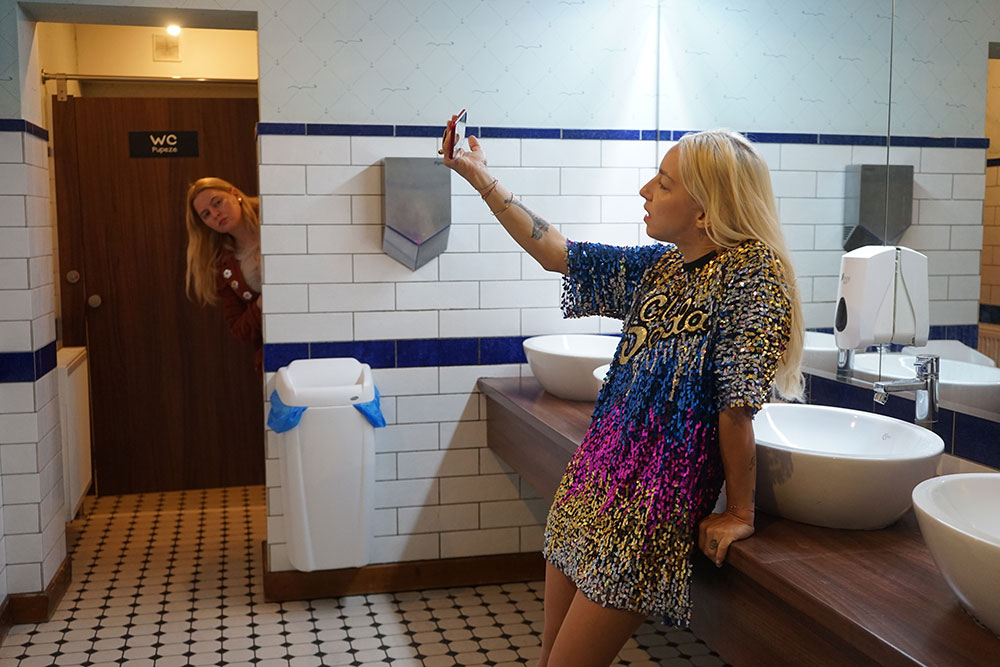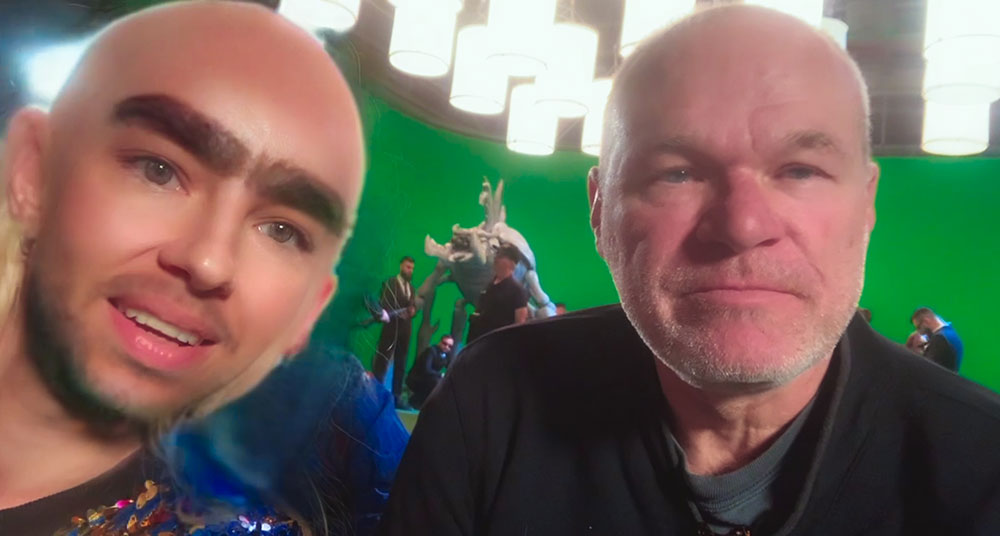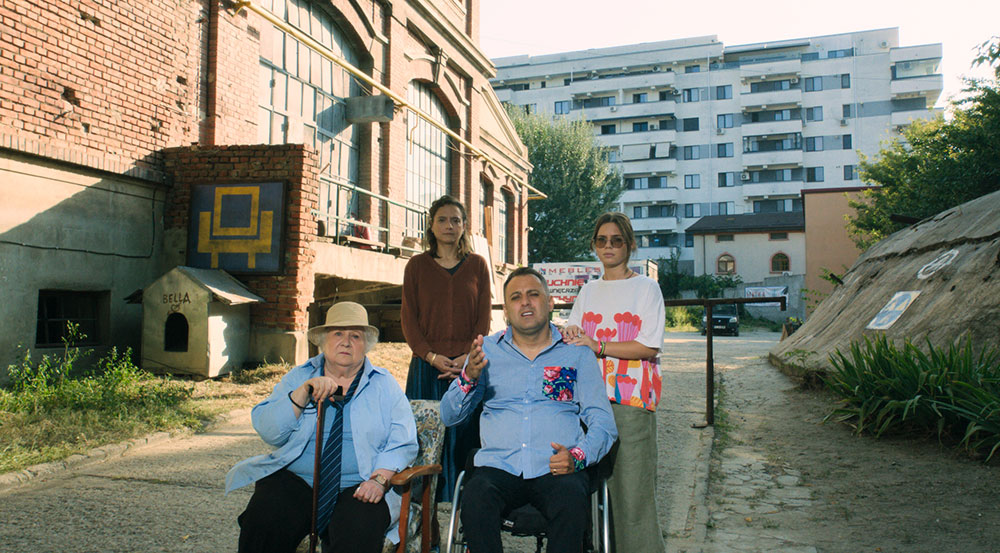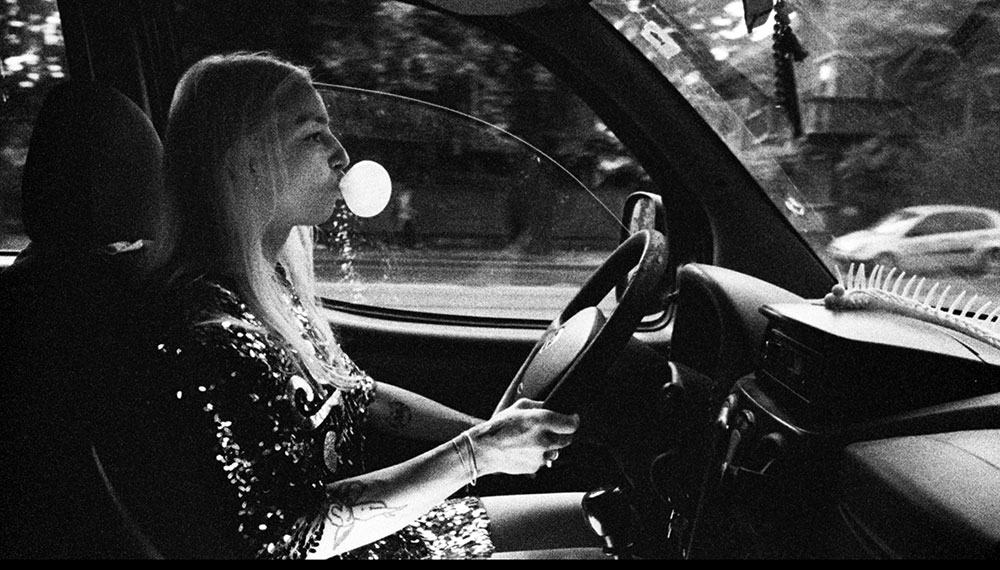Radu Jude’s formally audacious and scabrous new “humorless comedy” Do Not Expect Too Much from the End of the World (2023) is, like his I Do Not Care if We Go Down in History as Barbarians (2018), bipartite in structure, with each part raising open questions about the other. The first follows Angela (Ilinca Manolache), a maniacally overworked production assistant casting non-actors for an Austrian corporate workplace safety film. Continually gridlocked in traffic, Angela sustains herself by downing energy drinks and listening to high-BPM turbofolk. Jude crosscuts this ultra-contemporary story with reworked and step-printed footage from a 1981 Ceaușescu-era propaganda film called Angela Moves On, following a taciturn Bucharest taxi driver. The final strand woven into this first section involves the tirades of Angela’s TikTok alter-ego, “Bobiță,” an Andrew Tate-styled misogynist concealed behind a monobrowed AI face filter. The shorter second section features the shooting of the corporate video for which Angela has labored so hard.
Hybrid, digressive, self-scrutinizing, and unwavering in its irreverence, The End of the World has more in common with the collagist approach of Dušan Makavejev’s Innocence Unprotected (1968) or Alexander Kluge et al’s Germany in Autumn (1978), than with recent popular anti-capitalist farces such as Parasite (2019) or Triangle of Sadness (2022). I met up with Radu in the salubrious environs of Charlottenburg, Berlin—where he is currently a DAAD resident—to discuss the film.

George MacBeth: What role do you think that filmmaking plays in the process of political consciousness-raising?
Radu Jude: That’s a tough question. To answer we would have to define first of all what cinema is and what kind of political action you mean. Because from a certain point of view, an advertisement or a commercial is also part of cinema, which has a, let’s say, political role to make you buy this product rather than the other. So, at some point, I was thinking that—maybe it’s a bit provocative, but just for the fun of it I will say—that what I want to do is not to have any impact.
I think of all the films which seek to have a certain impact and to change their audience. And I think, Oh my god, actually I wouldn’t want my film to be able to change an audience. I think that would be the end of everything! I would go to the opposite end and say I would like the film not to change people or make them desire change or to take action or something, but to reflect a little bit. I’m more and more convinced that cinema should be, before becoming a tool for action, a tool for a certain, specific way of reflecting, because it’s a specific way of describing—in a very broad sense of the term—the world. I always have in mind this phrase of [Jacques] Rivette, who said that “the role of cinema is to plunge people into horror.”
GM: Many arthouse filmmakers seem somehow threatened by the incursion of digital media and social media onto their terrain, as though these are eroding the attentive conditions necessary to appreciate serious film. What I found so arresting and interesting about DNETMftEotW is its portrayal of what it’s actually like to consume and produce content for social media. It wasn’t patronizing or demeaning toward the film’s content creator [Angela/Bobiță], and I think through her portrayal it got to the heart somehow of what it’s like to be a “poster.” I was wondering, do you consume much TikTok yourself? Are you highly online?
RJ: Well, uh . . . [Radu leaves the room and returns with his phone] I try not to do it that much. But what I find interesting is that, if you’re honest with yourself as a filmmaker, you must say that you know there are directions, there are potentialities, there are people, places, and costumes here that you don’t see in cinema. And I know that these platforms spy on you, or use your data, and that the spreading of fake news is very rampant, but at the same time I’m interested in its potentialities. Yet, when I open my TikTok . . . [He opens TikTok on his phone and we begin to watch a series of Romanian TikToks together; a girl talks to camera about “how the dick tastes”; an old man at a bus stop with a face as creased and wrinkled as Hockney’s portraits of an elderly W. H. Auden; an animated bird screams “Sofiiiiaa” in a chipmunk voice; a girl twerks to turbofolk in a kitchen.] I never saw this place, this woman, this scene, in a Romanian film.

GM: I feel like Bobiță could appear on screen any moment right now.
RJ: Exactly. I feel there are a lot of potentialities to be explored on these platforms. I think there’s also an energy from the beginning of cinema. This has also been theorized, I read a few months ago an article by Caroline Golum on MUBI about TikTok and the language of early cinema. She makes this comparison between these kind of videos and Lumière or Edison’s films, which I consider to also be correct. Of course, you can complain about whether these platforms are ruining the cinema-going experience. But then I’m just thinking that a crisis like this should simply prompt cinema to catch up!
GM: Rather than expelling it as some foreign element that you need to cleanse—
RJ: Yes, and also cinema—or at least a certain direction in cinema that I am interested in—has always been an ocean that could accommodate into it all the rivers. So instead of complaining about TikTok’s language or videos, try to transform it into cinema. That was always the way cinema did it, like literature. If you read poetry or prose after modernism, literature always incorporated different species of texts.
GM: There is a culture of constant remixing on TikTok. You’ll see some original content, and then it will be iterated through specific genres for repurposing this original video, such as lip syncs or reaction videos, and I find that your films behave similarly toward their source material. For instance, Bad Luck Banging [2021] is a kind of meta-commentary on a sex tape, and Uppercase Print [2020] works with a Brechtian dramatization of Securitate testimonies. However, it’s most obvious in this latest film: both through Bobiță’s amazing monologues and the reworking of Angela Moves On. I was wondering why you chose this film, out of what was presumably quite a large selection of Ceaușescu-era state films? Was there something specific that jumped out to you about it?
RJ: I think there are several specific things about this film. First, I think it’s the only film [from this era] where the female protagonist has a role traditionally assigned to men—a driver. Then I watched it, and I was not very impressed. I think it’s an average film for the era. However, watching Angela Moves On again and again you discover a lot of subversive elements within it, which are not so obvious. Most of them are in the way it’s shot, in its documentary dimension. So, you can see—but it’s just for one second, hence why I had to slow the footage down—through the car window, a rundown neighborhood, or poor people waiting in line for food, or poor people waiting for a bus, things which were not supposed to appear on film. They don’t appear in the first field of action, but they are always in the background, on the fringes. And I found it interesting that you can then mine the documentary elements out from a fiction film—to treat it like a documentary and to extract the documentary elements from inside the fiction. Then I asked, why not make a comparison between two modes of representation?
GM: The film then introduces a comparison between Angela Moves On and a contemporary corporate safety film. I thought this was an interesting way to enrich the current discussion around censorship, moving it off the hokey culture-war terrain of “free speech.” I was wondering how much this aspect of the film was informed by your own experience of working in the commercial film sector?
RJ: Oh, 100%. The story of the woman driving until exhausted and in danger of dying is something that I experienced myself many, many times when I was working as assistant director. This is how I started in cinema, from many years doing very low jobs. I knew about a case when someone died in a situation like [Angela’s]. Phoning all the time the production manager to say, “I’m too tired, I can’t go on” and them replying, “Drink a coffee, drink a Red Bull, sleep 10 minutes on the road, and go on.” I didn’t kill her character because I thought it would have been too strong, and then the second part would be useless in a way.
GM: And we can already feel that she is approaching the point of collapse through overwork anyway.
RJ: Exactly. I wanted this shadow of violent death to loom over the film, and to feel like a possibility that could happen at any time. So, yes, the film is based on my former experiences. But these former experiences, I think, I used only because they’re typical. One of the things that I’m a bit against in the cinema of today, not only in cinema but also in literature, and maybe other art that I know less about, is this obsession with personal stories. Tell your story, tell what happened to you.
GM: “Speak your truth.”
RJ: “Your truth.” Now we are flooded with films about the filmmaker’s divorce or their fight with his or her girlfriend, boyfriend, whatever; or films and documentaries about their kids, their grandma, grandpa—I don’t know, it’s all over. I’m not opposed to that necessarily, but I think that not all cinema should be like this. Cinema is a tool for looking outside yourself. But in the case of DNETMftEotW, I started from these personal recollections, not because they were mine, but because, after many years—these stories happened more than 10 years ago—you discover in such experiences that they were kind of exemplary. They were symbolic. You don’t notice that when they are happening. You know, in the flow of things, one thing happens after another, so you don’t notice. But after years, you look back and you say well, this small story or this anecdote or this thing that happened in a way embodies and in a way contains all the other problems.
GM: There is one point when Angela’s mother complains about the vulgarity and prurience of this “Bobiță” character that her daughter plays up online, and Angela declares in response that she thinks people are intelligent enough to understand that she is “satirizing by means of grotesquerie, like Charlie Hebdo.” Would you say that you have a similar attitude toward comedy and the grotesque?
RJ: Yeah, but I don’t think I can speak of it in terms of a principle, as such. Like all these things, humor is a weapon, which can be used in certain ways: in toxic ways, in dangerous ways, in transgressive ways, or in intelligent ways. I would never endorse humor, for instance, which is against weaker categories. But what I believe in, and that maybe shows in this film, is that there is a possibility for a certain critique or a certain attitude towards the world to be expressed through a characterization that goes to the extreme of the stupid or idiotic direction. So instead of counteracting such a tendency simply by saying “Oh, this is not good, we should be on the other side,” we push that thing to the extreme. And by pushing it you make it clear how stupid it is and how ridiculous it is. And yes, Charlie Hebdo sometimes does this.

GM: I was also thinking that Christoph Schlingensief worked in a similar manner, or Neue Slowenische Kunst. These “over-identification” strategies, I guess you could call them. Taking an ideology more seriously than it takes itself.
RJ: Exactly, yeah. Of course, this can put some people onto shaky ground. I even think we lost some financing from important European public funders because of Bobiță—because they were afraid, basically. They said, “What if the audience considers that this Bobiță is the message of the film?” The question remains, in a way the question is legitimate. But then everything can be questioned from this point of view. I think art should have this power to put people on shaky ground a little bit. But of course, now it depends in which way, and this is why I cannot say it’s like a principle.
Even my films that are about big topics, like the Holocaust, or Holocaust memory [such as Barbarians], or whatever, tend more towards the “termite” direction, if we can use this term [following Manny Farber’s distinction between “termite” and “white elephant” films]. Because they’re using their own tools, their own genre, to go deeper and not to make grand statements about the state of the world.
I like more and more this idea of a sketch in cinema, that the thing shouldn’t be fully, perfectly well-made, or well-structured. I like the literature of digressions. I like the so-called pre-Balzac literature. I like—
GM: Laurence Sterne?
RJ: That’s a great example, yes. Some of the digressions could go away, some could stay. This is what I always hear about the film when we are in the editing stages. Sometimes co-producers or whoever complain and say this scene is not necessary, you can get rid of it. But in DNETMftEotW, for instance, actually nothing is mandatory. All the scenes—you can say Bobiță could be out, like the guy from the financing fund told me, you don’t need it. Of course, you don’t need it, it can work without it! You also don’t need the 1981 film—out—you don’t need a second story—out—and you would end up with a much shorter, regular film. I think that if I bring something to film, I bring these digressions, digressions which are for me as important—if not more important—than the main storyline or drama. I guess more important, in a way, because I wouldn’t do the film without them.
GM: I’ll finish with a kind of state-of-the-art question. When I saw you on the Berlinale 76 jury, back in February this year, I remember at the opening press conference you quoted [the Romanian French avant-garde poet and filmmaker] Isidore Isou’s claim that “cinema is the industry of money and stupidity,” or words to this effect. Are you pessimistic about the future of intelligent, self-reflexive, critical filmmaking?
RJ: I am pessimistic, but I think it’s a fight worth fighting. So that gives me a lot of energy and a lot of hope, in a way. I think it’s even more energizing that you have to do it and to be a little bit in the margins. I mean, imagine that Netflix would take only these kind of serious films, then I would try to do a soap opera! In a way I think the position of the margin is a necessary one. It’s a place where you can start, with your own feeble powers, a bit of a fight. So, I like it.
Do Not Expect Too Much from the End of the World opens at IFC Center on March 22.



